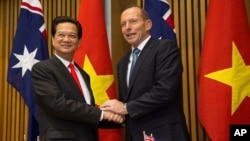Vietnam and Australia have moved to further strengthen bilateral security ties during the current two-day official visit to Australia by Vietnam’s Prime Minister Nguyen Tan Dung. Analysts say the closer ties come against a backdrop of China’s growing influence in the region and ongoing tensions over rival claims to the South China Sea.
Dung told reporters in Canberra, Vietnam and Australia agreed to the importance of maritime security and freedom of navigation in the South China Sea, marked by compliance with international standards.
China, which has significant claims in the South China Sea, is embroiled in territorial disputes with several countries, including Vietnam, Malaysia and the Philippines.
Under the joint agreement between Canberra and Hanoi,120 Vietnamese military personnel will be trained in Australia with Vietnam participating in joint military training exercises. Defense ties were established in 1999. Since then over 1,200 Vietnamese have taken part in defense cooperation, education and training.
Christopher Roberts, a political scientist at the University of New South Wales, said the agreement highlighted concerns held by Vietnam and Australia over tensions in the South China Sea.
“It shows at one level a statement of concern not just by Vietnam but also by Australia about recent actions, particularly over the last six to seven years - some rising more in the last year or so of China in the South China Sea and of course perhaps from Australia’s perspective at the forefront also the Chinese position in the East China Sea and more broadly in terms of [China’s] military modernization,” he said.
Vietnam’s Dung called for restraint to avoid any steps that might escalate tensions in the region, including the use of force to, as he said, unilaterally change the status quo.
Carl Thayer, a defense analyst and consultant, said the key factor for Vietnam was that Australia had a close relationship with the United States.
“Australia is an American ally. That’s the key thing - to get close to Australia and Vietnam is getting close to the Philippines on a strategic partnership agreement," he said. "Then you gain some leverage in the relationship. You are seen as a responsible actor conforming to the international norms.”
Thayer said Australia and Vietnam shared a growing convergence of interests due to the charged security environment and the changing power balance among the major powers.
On other issues, the communiqué included announced increased cooperation in multilateral institutions, such as the United Nations and Asia Pacific Economic Community (APEC) as well as Association of South East Asian Nations (ASEAN).
Australia and Vietnam have seen a rapid increase in business, with two-way trade at $6 billion in 2014, leading to Vietnam becoming Australia’s fastest growing trade partner in South East Asia.
Australia’s trade minister is scheduled to travel to Vietnam later this year with a high-level delegation to draw up further plans for trade and investment.
Dung is also travelling to New Zealand where trade ties have also increased sharply, with two-way trade more than doubling from just five years earlier to $794 million in 2014.




